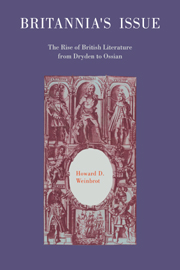Book contents
- Frontmatter
- Contents
- Acknowledgments and editorial notes
- INTRODUCTION: An overview of scope and method
- PART I CONTEXTS: INTELLECTUAL, PSYCHOLOGICAL, AND NATIONAL
- PART II TEXTS WITHIN CONTEXTS. ESSAYING ENGLAND: OUR GENIUS, OUR CLIME
- PART III GROWING ONE'S OWN. THE BRITISH ODE FROM COWLEY TO GRAY
- PART IV EXPANDING THE BORDERS. JEWS AND JESUS: THIS ISRAEL, THIS ENGLAND
- PART V CELTS, GERMANS, AND SCOTS: TOWARDS A UNITED KINGDOM
- Prologue to Part V
- 13 CELTIC SCOTLAND
- 14 OSSIAN IN SCOTLAND, GREAT BRITAIN, AND MODERN EUROPE: JOINING BRITANNIA'S ISSUE
- 15 CONCLUSION. SYNTHESIZING ALL THE NATIONS UNDER HEAVEN
- APPENDIX: The text of Handel's “Israel in Egypt”
- Index
15 - CONCLUSION. SYNTHESIZING ALL THE NATIONS UNDER HEAVEN
Published online by Cambridge University Press: 15 December 2009
- Frontmatter
- Contents
- Acknowledgments and editorial notes
- INTRODUCTION: An overview of scope and method
- PART I CONTEXTS: INTELLECTUAL, PSYCHOLOGICAL, AND NATIONAL
- PART II TEXTS WITHIN CONTEXTS. ESSAYING ENGLAND: OUR GENIUS, OUR CLIME
- PART III GROWING ONE'S OWN. THE BRITISH ODE FROM COWLEY TO GRAY
- PART IV EXPANDING THE BORDERS. JEWS AND JESUS: THIS ISRAEL, THIS ENGLAND
- PART V CELTS, GERMANS, AND SCOTS: TOWARDS A UNITED KINGDOM
- Prologue to Part V
- 13 CELTIC SCOTLAND
- 14 OSSIAN IN SCOTLAND, GREAT BRITAIN, AND MODERN EUROPE: JOINING BRITANNIA'S ISSUE
- 15 CONCLUSION. SYNTHESIZING ALL THE NATIONS UNDER HEAVEN
- APPENDIX: The text of Handel's “Israel in Egypt”
- Index
Summary
How could it be that so apparently insular and idiosyncratic a nation as Britain could also be so open to apparently alien strains? Why in 1753 refuse to allow a few native-born Jews to be naturalized, while also exploiting the spiritual values, poetic devices, and historical parallels of the Old Testament? Why seek to destroy the Scottish nation in 1746 while soon thereafter helping it to help itself to such extraordinary achievements of literary and intellectual history?
The answers to such questions are both simple and complex. Contradictions generally have been part of human life and generally have been ignored or assumed to be normal. “So what?” and “who cares?” and “things change” are appropriate answers for all but the fussy academic frustrated by life's reluctance to conform to his schemes. That much being said, there are indeed some reasons for Britannia's inclusive muse, and some reasons for why she could dislike foreigners, including her own, from whom she nonetheless condescends to profit. She also knows that England is the guiding force behind Britain, and that Britain herself is an amalgam of once alien nations. The growing eighteenth-century ability to move beyond classical guidance and towards an amalgam of native voices is, I suggest, consistent with theories of national origin.
We already have seen how Celts and Jews could be defined as primitive Britons. However different the dominant culture now might be, accepting ancestral roots is a form of accepting oneself. Alternatively, defining the Jews as an alien beleaguered minority in need of protection also defines the dominant culture; they still once had God's revelation and were inspired by Him beautifully to sing beautiful truths.
- Type
- Chapter
- Information
- Britannia's IssueThe Rise of British Literature from Dryden to Ossian, pp. 557 - 571Publisher: Cambridge University PressPrint publication year: 1993



